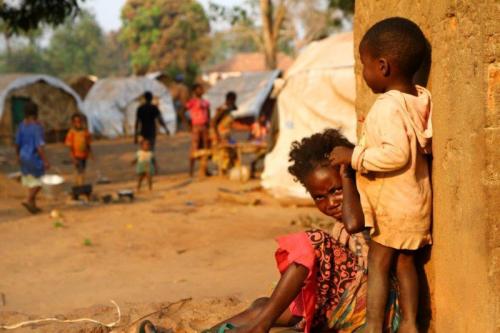Central African Republic: Executions by Rebel Group
Murder of 32 Civilians, Captured Fighters
A rebel group in the Central African Republic executed at least 32 civilians and captured fighters after clashes in December 2016 with another rebel group in the Ouaka province.

Children from Bakala in a displacement camp in Grimali, Central African Republic, January 24, 2017. Approximately 10,000 people have fled fighting between the UPC and the FPRC in Ouaka province since late November 2016.
In the town of Bakala, rebels from the Union for Peace in the Central African Republic (l'Union pour la Paix en Centrafrique, UPC), on December 12, executed 25 people after calling them to a school for an alleged meeting. Earlier that day, UPC fighters executed seven men who were returning from a nearby gold mine. Accounts of the incidents were provided by a survivor and eight witnesses, including five men who were forced to help dispose of the bodies. At least 29 other civilians have been killed in fighting around Bakala since late November.
“These executions are brazen war crimes by UPC fighters who feel free to kill at will,” said Lewis Mudge, Africa researcher at Human Rights Watch. “The group is carrying out its killing sprees with no fear of punishment, despite the presence of United Nations peacekeepers.”
The appointment on February 15, 2017 of a chief prosecutor for the Special Criminal Court – a court to be staffed with national and international judges and prosecutors in the capital, Bangui, to prosecute grave human rights violations since 2003 – marks an important step towards accountability, Human Rights Watch said. The court should now be further staffed without delay, so it can begin investigations and prosecutions.
Local residents and officials told Human Rights Watch that tensions between the UPC and the Popular Front for the Renaissance in the Central African Republic (Front Populaire pour la Renaissance de la Centrafrique, FPRC), another rebel group drawn from the predominantly Muslim Seleka fighters, began escalating late last year. Fighting started around Mourouba, 18 kilometers west of Bakala, on November 27, 2016, and the UPC then attacked civilians they suspected of belonging to anti-balaka militia allied with the FPRC.
The FPRC has allied itself with anti-balaka militias, its former enemy, to fight the UPC. The anti-balaka emerged in 2013, largely from existing self-defense groups to resist Seleka abuses, and themselves went on to commit serious abuses against civilians.
In late January 2017, Human Rights Watch interviewed 28 people in and around Bakala, including victims of other UPC crimes, relatives of victims, and UPC commanders. The total number of victims is most likely higher than the 32 people executed and the 29 civilians killed during clashes because dozens of other people are unaccounted for, family members of the missing people say. Human Rights Watch was unable to confirm all reported killings due to limited access and security concerns.
“These executions are brazen war crimes by UPC fighters who feel free to kill at will,” said Lewis Mudge, Africa researcher at Human Rights Watch. “The group is carrying out its killing sprees with no fear of punishment, despite the presence of United Nations peacekeepers.”
The appointment on February 15, 2017 of a chief prosecutor for the Special Criminal Court – a court to be staffed with national and international judges and prosecutors in the capital, Bangui, to prosecute grave human rights violations since 2003 – marks an important step towards accountability, Human Rights Watch said. The court should now be further staffed without delay, so it can begin investigations and prosecutions.
Local residents and officials told Human Rights Watch that tensions between the UPC and the Popular Front for the Renaissance in the Central African Republic (Front Populaire pour la Renaissance de la Centrafrique, FPRC), another rebel group drawn from the predominantly Muslim Seleka fighters, began escalating late last year. Fighting started around Mourouba, 18 kilometers west of Bakala, on November 27, 2016, and the UPC then attacked civilians they suspected of belonging to anti-balaka militia allied with the FPRC.
The FPRC has allied itself with anti-balaka militias, its former enemy, to fight the UPC. The anti-balaka emerged in 2013, largely from existing self-defense groups to resist Seleka abuses, and themselves went on to commit serious abuses against civilians.
In late January 2017, Human Rights Watch interviewed 28 people in and around Bakala, including victims of other UPC crimes, relatives of victims, and UPC commanders. The total number of victims is most likely higher than the 32 people executed and the 29 civilians killed during clashes because dozens of other people are unaccounted for, family members of the missing people say. Human Rights Watch was unable to confirm all reported killings due to limited access and security concerns.
Source:Human Rights Wtach
- 541 reads
Human Rights
Fostering a More Humane World: The 28th Eurasian Economic Summi

Conscience, Hope, and Action: Keys to Global Peace and Sustainability

Ringing FOWPAL’s Peace Bell for the World:Nobel Peace Prize Laureates’ Visions and Actions

Protecting the World’s Cultural Diversity for a Sustainable Future

Puppet Show I International Friendship Day 2020

